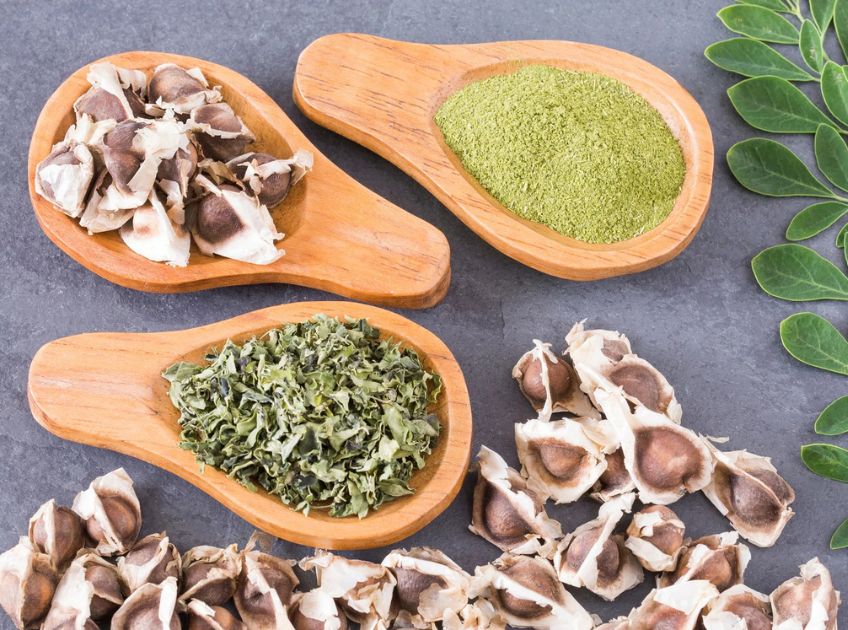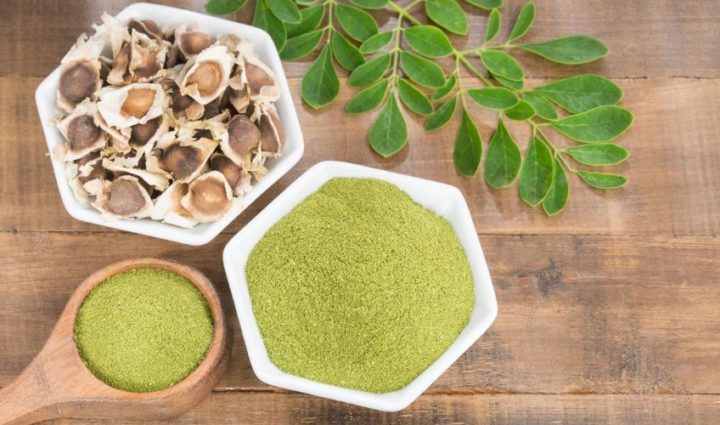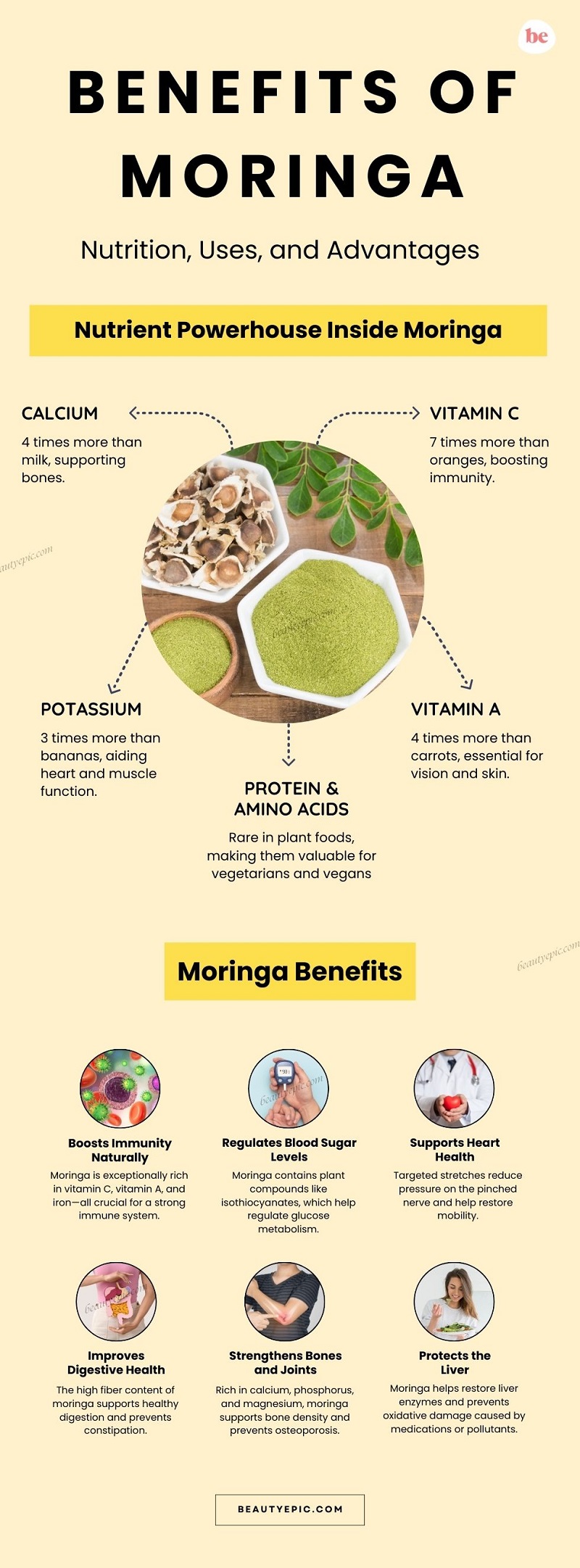
Important: This article is for informational purposes only. Please read our full disclaimer for more details.
Known as the “miracle tree” or “drumstick tree”, Moringa Oleifera (1) has been celebrated in traditional medicine for centuries. Originating from South Asia and widely grown in Africa and India, moringa is now recognized worldwide as a superfood. Its leaves, seeds, pods, and oil are packed with essential nutrients that support health, making it a natural addition to today’s wellness routines.
The Nutrient Powerhouse Inside Moringa
Moringa is exceptionally nutrient-dense, offering:
- Vitamin C – 7 times more than oranges, boosting immunity.
- Calcium – 4 times more than milk, supporting bones.
- Vitamin A – 4 times more than carrots, essential for vision and skin.
- Potassium – 3 times more than bananas, aiding heart and muscle function.
- Protein and amino acids – rare in plant foods, making them valuable for vegetarians and vegans.
Science says: A study in the International Journal of Food Science and Nutrition (2011) highlighted moringa leaves as one of the richest plant sources of vital nutrients, useful in combating malnutrition (2).
Top 10 Health Benefits of Moringa
1. Boosts Immunity Naturally
Moringa is exceptionally rich in vitamin C, vitamin A, and iron—all crucial for a strong immune system. Vitamin C supports white blood cell activity, vitamin A helps regulate immune responses, and iron prevents anemia, which often weakens the immune system.
Study Insight: A 2010 study in the Journal of Medicinal Plants Research confirmed that moringa leaf extract enhances immune function by increasing antibody production (3).
2. Regulates Blood Sugar Levels
Unstable blood sugar can lead to fatigue, weight gain, and diabetes. Moringa contains plant compounds like isothiocyanates, which help regulate glucose metabolism.
Study Insight: A clinical trial in the Journal of Food Science and Technology (2014) found that supplementing meals with moringa leaf powder significantly reduced post-meal blood sugar spikes in type 2 diabetics (4).
3. Supports Heart Health
Moringa contributes to cardiovascular health by lowering bad cholesterol (LDL) and triglycerides, while increasing good cholesterol (HDL). Its potassium content also supports healthy blood pressure levels.
Study Insight: Research in the Journal of Ethnopharmacology (2008) found moringa leaf extract reduced cholesterol levels, protecting against heart disease (5).
4. Improves Digestive Health
The high fiber content of moringa supports healthy digestion and prevents constipation. Its anti-inflammatory and antibacterial properties may help with conditions like gastritis, colitis, and stomach ulcers.
Study Insight: Animal studies published in the Phytotherapy Research Journal showed moringa’s gastroprotective effects, helping reduce stomach acidity and ulcer formation (6).
5. Enhances Skin and Hair
Moringa’s vitamin A boosts collagen production, while vitamin E protects skin from oxidative damage. Its seed oil (ben oil) deeply hydrates and acts as a natural cleanser, making it popular in cosmetics.
Study Insight: The Journal of Cosmetic Science reported that moringa oil helps protect skin from environmental pollutants and keeps it youthful (7).
6. Protects the Liver
The liver processes toxins, hormones, and nutrients. Moringa helps restore liver enzymes and prevents oxidative damage caused by medications or pollutants.
Study Insight: A study in the Journal of Medicinal Food (2010) found moringa leaf extract reduced liver damage in rats exposed to toxins, showing hepatoprotective effects (8).
7. Supports Brain Health
Moringa’s antioxidants protect neurons from free radical damage. Its high levels of vitamins C and E improve brain function, while amino acids like tryptophan support serotonin production for better mood and sleep.
Study Insight: Research in the Journal of Alzheimer’s Disease (2012) suggested moringa may slow cognitive decline due to its neuroprotective properties (9).
8. Strengthens Bones and Joints
Rich in calcium, phosphorus, and magnesium, moringa supports bone density and prevents osteoporosis. Its anti-inflammatory compounds may also reduce joint pain in arthritis.
Study Insight: Studies in the International Journal of Pharmacy and Pharmaceutical Sciences showed moringa extracts improved bone health markers in animal trials (10).
9. Enhances Wound Healing
Moringa leaves, seeds, and extracts have antimicrobial and clotting properties, helping wounds heal faster and reducing infection risk.
Study Insight: A 2015 study in the African Journal of Biotechnology highlighted moringa’s antibacterial properties against pathogens like E. coli and Staphylococcus aureus (11).
10. Provides Energy and Fights Fatigue
Iron and B vitamins in moringa play a key role in energy production. By reducing oxidative stress and improving nutrient absorption, moringa helps fight fatigue and sustain stamina.
Study Insight: Research in the Journal of Food Biochemistry showed moringa supplementation improved hemoglobin levels and reduced tiredness in individuals with anemia (12).
Can Moringa Help With Weight Loss?
Moringa may support weight management by:
- Boosting metabolism due to its rich nutrient profile.
- Reducing inflammation and oxidative stress, both linked to obesity.
- Supporting healthy blood sugar levels which helps curb cravings.
While moringa is not a magic fat-burner, studies suggest it can complement a balanced diet and exercise routine.
Side Effects and Risks of Moringa
Moringa is generally safe, but there are some considerations:
- Digestive discomfort – high doses may cause nausea or diarrhea.
- Pregnancy caution – moringa root and bark should be avoided as they may stimulate contractions.
- Medication interactions – it may enhance the effects of drugs for blood pressure, thyroid, or diabetes. Always consult a doctor before long-term use.
Final Thoughts
From boosting immunity and protecting the heart to enhancing skin and energy, moringa offers a wide range of science-backed health benefits. While it’s not a cure-all, adding moringa to your routine in safe amounts can significantly improve overall wellness.
Whether in powder, capsule, or fresh leaf form, moringa truly lives up to its title as a “miracle tree.” For best results, combine it with a balanced lifestyle and always consult a healthcare professional if you’re on medication.
Frequently Asked Questions (FAQ’S)
1. How should I consume moringa daily?
A. Moringa can be added to smoothies, soups, or teas in powder form, consumed as capsules, or eaten fresh as leaves and pods.
2. Can moringa replace my multivitamin?
A. Moringa is nutrient-rich but may not provide all essential nutrients in adequate amounts. It can complement, but not fully replace, a balanced diet or supplements.
3. Is moringa safe for children?
A. Yes, in small amounts. In fact, moringa is often used in regions with malnutrition to support child growth, but dosing should be discussed with a paediatrician.

















